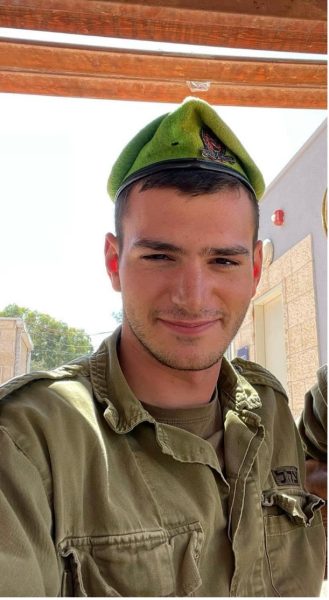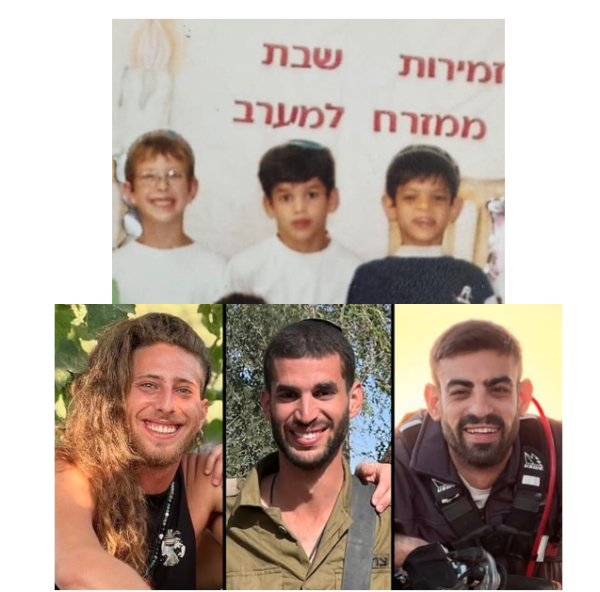By Leah Garber
Dear Mom and Dad, I love you very much. Everything is as it should be. I myself chose it. I lived a good and interesting life. At the same time, I was never afraid of death. I made this choice myself, and I followed it to the end. I fell honorably for my people. I have no regrets.”
Twenty-five-year-old Yosef Giteratz, an armored fighter, was killed in Gaza on Monday. A talented scientist in the fields of medicine and computer science, he wrote a “sealed letter” to his parents in the event of the horrible scenario that—sadly—came true.

There are words that evoke a storm of emotions—especially when we realize the state of mind of the author when they wrote the words and our own state of mind when we read them. We are infinitely proud of our finest soldiers who sacrificed their lives so we can live ours, and we are enormously anxious about the daily list of the dead—the addition of name after name, each scorched with blood and pain.
Some people believe that our souls sense the imminent death of the body that carries them, and have a hint of the shortening thread of life. Was this so for Yosef’s soul? Will his last dignified words and the noble consent with which he accepted his approaching death be a comfort to his parents? Or is it the other way around? Does Yosef’s greatness, revealed in his final message, only sharpen the loss?
I love you very much and am proud that you are my parents. You gave me a lot. I had a very interesting, rich, happy, unique life. My death only emphasizes that. You are certainly in a lot of pain. But you will overcome it. I would really like that. That’s the thing. The main thing I want. You both have many close people who will support you. Please find something positive in all of this. Be with the grandchildren. Help Israel. I’m fine.”

In their kindergarten class photo three innocent faces gazed naively at the camera. Friends from the same town who went to the same school smiled similar smiles, dreamed childhood dreams, and shared the same plans for when they grew up—perhaps they hoped to become pilots or firefighters or explore exotic lands. Surely dying so young was not among their dreams. Major Shay Shamriz was killed earlier this week in Gaza, and his two friends were killed at the Nova music festival on October 7.
What kind of reality do we live in when a single photo of a kindergarten class tells a tragic story of life under the shadow of terror, threats, and of death. And how terrible is our reality that such sad pictures are not unusual. October 7 blackened many pictures, extinguished smiles, and destroyed dreams.
Is this a necessary reality?
Forty-five years ago today, Israel’s then-prime minister, Menachem Begin, visited Egypt to enjoy the fruits of the historic peace agreement between Israel and Egypt, the largest of the enemy countries until then and the one that, to this day, remained faithful to its commitment to maintain the agreement.
Menachem Begin was one of the most important leaders in modern times—a man of vision, spirit, and action. In a brave, unusual call, he invited Egyptian President Anwar El-Sadat to visit Jerusalem. Sadat, another courageous leader, accepted the invitation, and his historic visit to the capital of Israel is remembered in the chronicles of both nations as a foundational moment.
The peace agreement signed on the lawn of the White House in Washington, D.C., mediated by President Jimmy Carter a few months later, was the first peace agreement signed between Israel and an Arab state, an enemy state that fought Israel vigorously for three decades—bloody decades for both nations. Begin and Sadat proved to their people and the world that a peace agreement is an achievable dream—demonstrating that gaps can be bridged and compromises reached as long as both sides want it, as long as both sides pursue peace.
Following that 1979 peace agreement with Egypt and the 1994 peace agreement with Jordan, Israel signed a third peace treaty with United Arab Emirates and the first not conditioned on territorial compromises and giving up land. Most recently Israel and Morocco signed a normalization agreement.

Theodor Herzl, the father of modern political Zionism is known for this quote: “If you will it, it is no dream,” and years later, John Lennon wrote these lyrics:
Imagine all the people
Livin’ life in peace
You may say I’m a dreamer
But I’m not the only one
I hope someday you’ll join us
And the world will be as one
If only there were leaders today like Begin and Sadat, the latter of whom paid with his life for his courageous leadership when he was murdered in 1981 by an assassin, a Muslim radical, who was convicted in the United States years later for his part in the 1993 attack on the Twin Towers. If only we could put aside the weapons and war machines, and channel our resources of war and hatred into growth and prosperity.
The pages of history will testify that we tried. Israel gave up territories, lands, and water resources. We made concessions, we evacuated settlements and towns for the sake of peace, for the sake of neighborliness, for the sake of life. But the day has not yet come to lay down the weapons altogether because great evil still calls and acts for Israel’s extinction.
We won’t allow that to happen, and this is why: Yosef, Shay, Avidan, and Oded, and many others are among the approximately 1,400 who have been killed since October 7 and among the many thousands who have died in war since the establishment of the state. As Golda Meir, Israel’s former prime minister rightly said: “If the Arabs lay down their arms, there will be no more war. If Israel lays down its arms, there will be no more State of Israel.” It is with profound pain, therefore, that the State of Israel bows its head before its heroes who have fallen in battle and before its citizens who were killed and slaughtered by bloodthirsty murderers.
We will continue to pray for peace three times a day; we will continue to greet each other with the word “peace;” we will continue to long for peace and agree to compromises for the sake of peace; but we will never give up our homeland.
Together, united, we will overcome.
Leah Garber is a senior vice president of JCC Association of North America and director of its Center for Israel Engagement in Jerusalem.